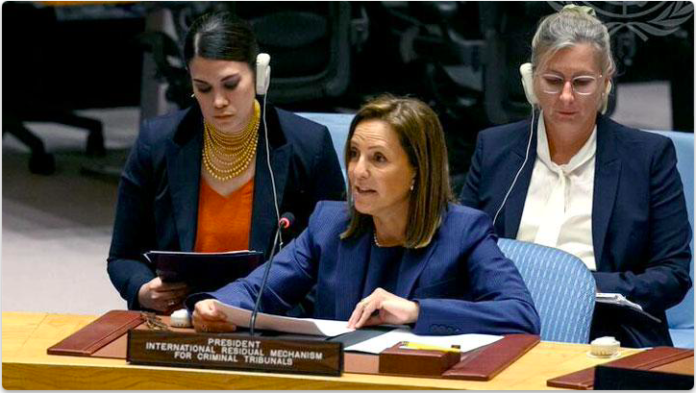In a recent address to the United Nations Security Council, President Graciela Gatti Santana of the International Residual Mechanism for Criminal Tribunals (Mechanism) highlighted the progress made by the Mechanism and called for urgent attention and assistance in addressing key challenges. The President commended the conclusion of all cases against 161 individuals indicted by the International Criminal Tribunal for the former Yugoslavia (ICTY) but emphasized the need for continued support in the enforcement of sentences. President Gatti Santana also stressed the predicament of acquitted or released persons relocated to Niger and underscored the persistent attempts to undermine the Mechanism’s work. The President concluded by expressing her determination to pursue innovative and efficient ways of operating, ensuring the Mechanism’s positive results.
In her address, President Gatti Santana acknowledged the Council’s decision to establish the ICTY in 1993 as a milestone in upholding the rule of law and ensuring accountability for violations of international humanitarian law. She highlighted the recent issuance of the Appeal Judgement in the case against Jovica Stanišić and Franko Simatović, signifying the completion of cases against all 161 indicted individuals.
Regarding the ongoing case against Félicien Kabuga, President Gatti Santana mentioned the Trial Chamber’s decision that the accused is unfit to stand trial and is unlikely to regain fitness. However, she emphasized that the proceedings would continue through an “alternative findings procedure,” which is expected to be appealed.
President Gatti Santana praised the work of the Office of the Prosecutor and its fugitive tracking team, citing the recent arrest of Fulgence Kayishema in South Africa as a reminder that justice remains achievable. She expressed confidence in Rwanda’s ability to efficiently handle the proceedings against Kayishema, which the Mechanism will be responsible for monitoring.
Three critical areas requiring the Council’s attention were highlighted by President Gatti Santana. Firstly, she expressed gratitude to the 13 states contributing to the enforcement of sentences but noted that the burden is not equally shared. She raised concerns about some convicted persons being returned to the United Nations Detention Unit in The Hague due to limited enforcement capabilities, impacting both the Mechanism and the host state.
The second challenge focused on the predicament of acquitted or released individuals relocated to Niger in December 2021. President Gatti Santana emphasized that resolving this situation requires collective efforts and urged the Council to recognize the untenability of the status quo.
Lastly, the President highlighted the persistent threats to the Mechanism’s work, including attempts to undermine it and deny genocide, glorify war criminals, and rewrite history. She specifically mentioned Serbia’s failure to arrest Petar Jojić and Vjerica Radeta. President Gatti Santana stressed the importance of consolidating and safeguarding the legacy of the ad hoc Tribunals and the Mechanism, making it more accessible.
In conclusion, President Gatti Santana expressed her determination to pursue innovative and efficient methods of operation to ensure the Mechanism’s continued positive results. She highlighted the significant progress made in planning the Mechanism’s future operations and called for the Council’s continued support in the face of mounting challenges.
The International Residual Mechanism for Criminal Tribunals (Mechanism) was established by UN Security Council Resolution 1966 (2010) to complete the remaining work of the International Criminal Tribunal for Rwanda and the International Criminal Tribunal for the former Yugoslavia. With branches in Arusha, Tanzania, and The Hague, Netherlands, the Mechanism aims to uphold the principles of international justice and accountability.
































































